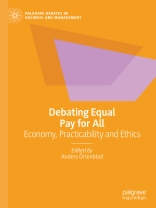This anthology debates the idea of giving all people – no matter which profession or position they have (and whether they have a job or not) – the same pay. Some contributors argue against equal pay for all, some for increased pay equality but not for total pay equality, and some argue for equal pay for all. There is no common conclusion in the book; instead, the book aims to encourage reflection as well as further debate on something that is often taken for granted, namely differentiated pay, by offering a set of various standpoints in the debate, backed-up with various kinds of arguments. Among bases for arguments that are put forward in the book, economy, practicability and ethics belong to the most frequently occurring ones. This book is the first one to be published in the book series Palgrave Debates in Business and Management.
Tabla de materias
Chapter: 1: Background and introduction: why debating equal pay for all?.- Part I: AGAINST EQUAL PAY FOR ALL.-Chapter: 2: Equal pay for all: an idea whose time has not, and will not, come.- Chapter: 3: Universal equal pay wrong-foots the distribution of incomes.- Chapter: 4: More onerous work deserves higher pay.- Chapter: 5: Equal pay for knowledge workers in academia: an unrealistic proposition.- Part II: AGAINST EQUAL PAY FOR ALL BUT FOR EQUAL MINIMUM INCOME FOR ALL.- Chapter: 6: Equal pay: a floor not a ceiling.- Chapter: 7: Limiting insecurity, not opportunity.- Part III: TOWARDS INCREASED PAY EQUALITY.- Chapter: 8: A “middle way” between the free market and full equality: a pay ratio.- Chapter: 9: Closing the gap: the benefits of lowering pay ratios.- Chapter:10: How fair is equal pay? The need for a more balanced perspective.- Chapter: 11: Are there moral limits to wageinequality?.- Chapter:12: Equal pay for a green future.- Part IV: FOR EQUAL PAY FOR ALL.- Chapter: 13: Can a Honduran have what a Norwegian has? Equal pay for all countries: an exploration.- Chapter: 14: Economic equality as a precondition for democracy and social justice.- Chapter:15: Defending equal pay for all against objections from the achievement principle.- Chapter:16: Equal pay as a precondition of justice?.- Chapter:17: Equal pay for all (per hour worked).
Sobre el autor
Anders Örtenblad is Professor of Working Life Science at the School of Business and Law, University of Agder, Norway. He is the Editor-in-Chief of the journal
The Learning Organization, and the editing founder of the book series
Palgrave Debates in Business and Management.












